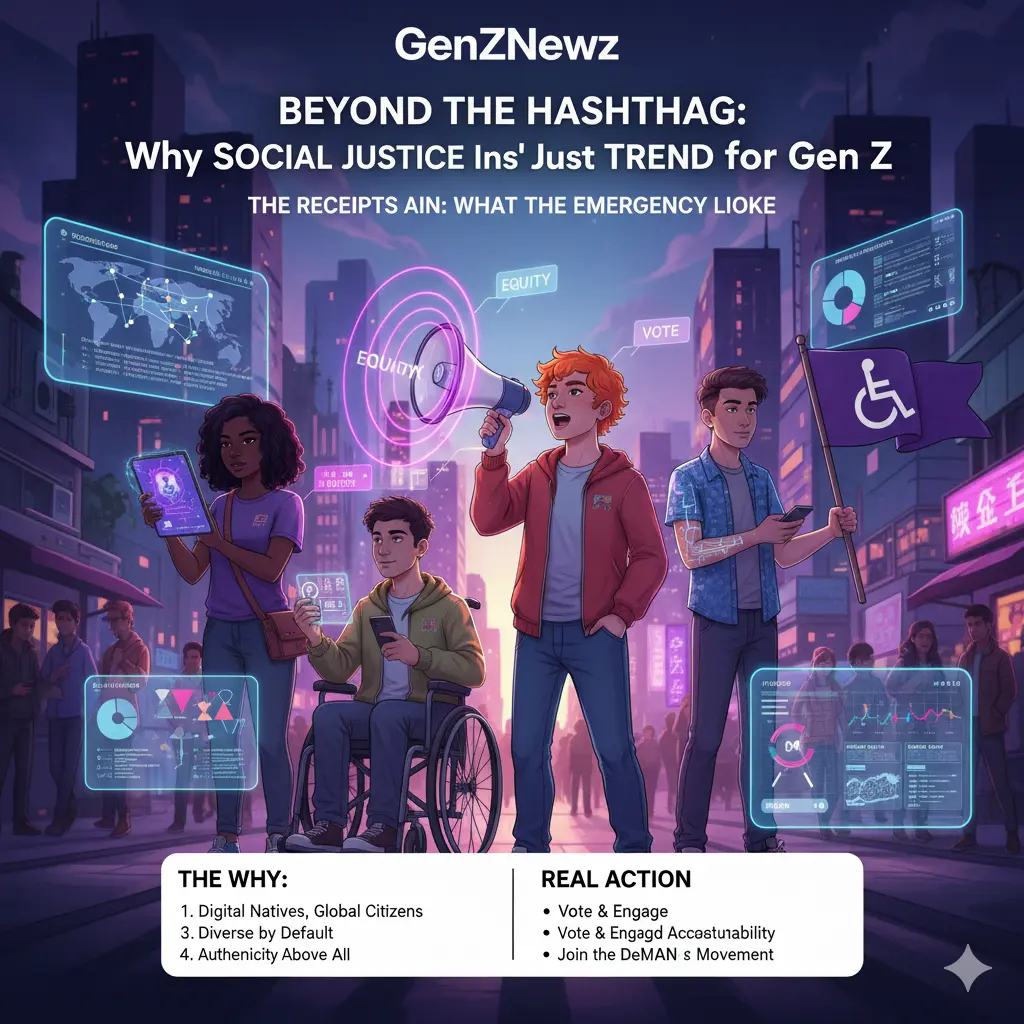Alright, here's an in-depth article about social justice, written for GenZNewz.
Beyond the Hashtag: Why Social Justice Isn't Just a Trend for Gen Z
Okay, let's cut through the noise. For Gen Z, "social justice" isn't a buzzword to throw around online or a fleeting trend; it's a foundational lens through which we view the world. We've grown up in an era of constant information, seeing systemic inequalities play out in real-time on our screens and in our communities. We know that fairness isn't a given, and silence often equals complicity.
So, what exactly is social justice, and why is our generation so deeply invested in it?
What Even Is Social Justice?
At its core, social justice is the idea that everyone deserves equal economic, political, and social rights and opportunities, regardless of their background, identity, or circumstances.
It's not just about individual acts of kindness (though those are great!). It's about looking at the bigger picture:
Systemic Issues: Understanding how institutions, policies, and cultural norms create and perpetuate inequality.
Power Dynamics: Recognizing who holds power and how it's used to benefit some while disadvantaging others.
Equity vs. Equality: Equality means giving everyone the same thing.
Equity means giving everyone what they need to succeed, recognizing that different people start from different places.
Why Gen Z is Driving the Conversation
Our generation didn't just stumble into this. Several factors have primed us to be fierce advocates for social justice:
- Digital Natives, Global Citizens: We've never known a world without the internet. This means instant access to news, diverse perspectives, and direct accounts of injustice from around the globe. A protest across the country or human rights abuses overseas aren't abstract concepts; they're viral videos in our feeds.
- Diverse by Default: Gen Z is the most diverse generation in history. We live, learn, and socialize with people from vastly different backgrounds, making us inherently more aware of varied experiences and challenges.
- Witnessing History (Unfiltered): From global protests for racial justice to ongoing battles for LGBTQ+ rights, climate action, and gender equality, we've seen movements unfold in real-time. We've learned the power of collective action and the importance of showing up.
Authenticity Above All: We value transparency and authenticity.
We can spot performative activism from a mile away and demand genuine commitment from individuals, brands, and institutions.
The Frontlines: Key Social Justice Issues for Gen Z
Our generation is actively engaged in a multitude of interconnected battles for justice:
Racial Justice: From police brutality to systemic discrimination in housing, education, and employment, the fight for racial equity remains a central pillar of social justice activism.
Environmental Justice: Recognizing that climate change disproportionately affects marginalized communities.
The fight for a sustainable future is inextricably linked to the fight for human rights. - LGBTQ+ Rights: Advocating for equal rights, protections, and acceptance for all sexual orientations and gender identities, pushing back against discriminatory laws and social stigma.
- Gender Equality: Challenging sexism, fighting for equal pay, reproductive rights, and dismantling patriarchal norms in all spheres of life.
- Economic Justice: Addressing wealth inequality, advocating for living wages, affordable housing, and equitable access to resources.
Disability Rights: Fighting for accessibility, inclusion, and challenging ableism in society.
Mental Health Awareness: Pushing for better access to mental healthcare, destigmatizing mental illness, and recognizing its intersection with other social justice issues.
Beyond the Hashtag: Real Action
It's easy to dismiss online activism, but for Gen Z, a hashtag is often just the start of the conversation. Real engagement looks like:
- Educating Ourselves and Others: Deep diving into history, critical race theory, intersectionality, and other frameworks to understand the roots of injustice.
- Voting & Political Engagement: Actively participating in elections, advocating for policy changes, and holding elected officials accountable.
- Supporting Marginalized Communities: Amplifying voices, donating to grassroots organizations, volunteering, and showing up in solidarity.
- Holding Institutions Accountable: Demanding change from schools, workplaces, brands, and governments. Boycotts and targeted campaigns can be powerful tools.
Challenging Bias: Actively working to unlearn personal biases and call out prejudice when we see it in our daily lives.
The path to social justice is long, complex, and often exhausting. But for Gen Z, it's not an optional add-on; it's a fundamental commitment to building a more equitable and humane world. We know that true progress requires constant effort, uncomfortable conversations, and unwavering solidarity. And we're ready for it.

Comments 0
No comments yet. Be the first to share your thoughts!
Leave a comment
Share your thoughts. Your email will not be published.